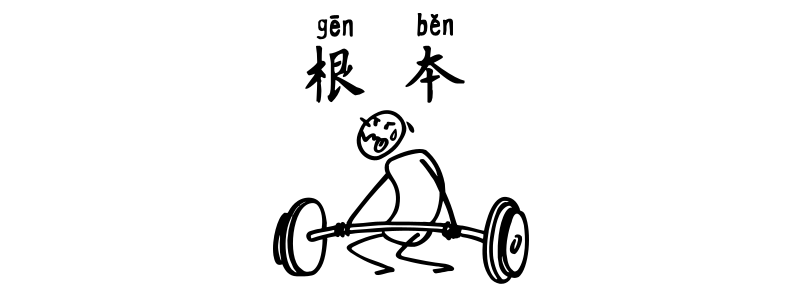Grammar Point:The Chinese word 絕對绝对 juéduì is commonly translated to “absolute” or “absolutely” in English. It is used to describe something that is completely certain, or without any doubt. Structure As an Adjective 這zhè場chǎng比賽bǐsài韓國hánguó有yǒu絕對juéduì的de優勢yōushì这zhè场chǎng比赛bǐsài韩国hánguó有yǒu绝对juéduì的de优势yōushìIn this game, South Korea has an absolute advantage. 太太tàitai在zài家裡jiālǐ是shì絕對juéduì的de權威quánwēi太太tàitai在zài家里jiālǐ是shì绝对juéduì的de权威quánwēiMy wife is an absolute authority at home. 狗gǒu對duì人rén有yǒu著zhe絕對juéduì的de忠誠zhōngchéng狗gǒu对duì人rén有yǒu着zhe绝对juéduì的de忠诚zhōngchéngDogs have absolute loyalty to…
Category: HSK 3
“Has no choice but to” – zhǐhǎo
Grammar Point:In Chinese, the expression 只好 zhǐhǎo is used to convey the idea that someone has no choice but to do something because it’s the only viable option or the best available solution in a given situation. Structure (S) + 只好 zhǐhǎo + V 大家dàjiā都dōu不想bùxiǎng當dāng班代bāndài, 只好zhǐhǎo抽籤chōuqiān決定juédìng大家dàjiā都dōu不想bùxiǎng当dāng班代bāndài, 只好zhǐhǎo抽签chōuqiān决定juédìngNo one wants to be the class representative, so…
Expressing “urgency” in Chinese
Grammar Point:In Chinese grammar, there are several words and phrases that can be used to express a sense of urgency or the need to do something quickly. Here are some commonly used expressions: 趕緊赶紧 gǎnjǐn, 趕赶快 gǎnkuài, 連连忙 liánmáng, and 立刻 lìkè. 趕緊/赶紧 gǎnjǐn It is often used in imperative sentences or statements to urge…
“Simply” in Chinese 1 – jiǎnzhí
Grammar Point:The word 簡简直 jiǎnzhí is a Chinese adverb often used to express exaggeration and convey a sense of something being untrue and hypothetical. It is similar in meaning to English words such as ‘simply,’ ‘absolutely,’ ‘completely,’ ‘literally,’ or ‘downright.’ Structure 簡简直 jiǎnzhí + Adj or V 那nà房子fángzi又yòu髒zāng又yòu暗àn簡直jiǎnzhí像xiàng鬼屋guǐwū, 你nǐ還是háishì找zhǎo別的biéde房子fángzi吧ba那nà房子fángzi又yòu脏zāng又yòu暗àn简直jiǎnzhí像xiàng鬼屋guǐwū, 你nǐ还是háishì找zhǎo别的biéde房子fángzi吧baThat house is dirty and dark;…
Emphasize a negation 2 – gēnběn
Grammar Point:根本 gēnběn is a Chinese adverb that the speaker uses to emphasize a negative view or a sense of impossibility. It often conveys a strong sense of negation or skepticism in sentences, highlighting that something is fundamentally lacking or impossible. Structure S + gēnběn + V 加州jiāzhōu房價fángjià那麼nàme高gāo, 年輕人niánqīngrén根本gēnběn買不起mǎibùqǐ房子fángzi加州jiāzhōu房价fángjià那么nàme高gāo, 年轻人niánqīngrén根本gēnběn买不起mǎibuqǐ房子fángziThe housing prices in California are…
“To dare” in Chinese – 敢 gǎn
Grammar Point:The Chinese character 敢 gǎn is primarily used as a verb and means “to dare” or “to have the courage to.” It is often used in sentences to express someone’s willingness or courage to do something. Structure S + 敢 gǎn + V 弟弟dìdi不bù敢gǎn吃chī辣là弟弟dìdi不bù敢gǎn吃chī辣làMy younger brother is afraid of eating spicy food. 你nǐ敢gǎn用yòng手shǒu抓zhuā蛇shé嗎ma? 你nǐ敢gǎn用yòng手shǒu抓zhuā蛇shé吗ma?…
“Only” in Chinese 2
Grammar Point:In Chinese, “only” can be translated using different words depending on the context. Two common translations for “only” are 光 guāng and 僅僅仅仅 jǐnjǐn. Structure S + guāng + V + O or Complement It can be used in both formal and casual situations. 他tā光guāng吃chī肉ròu, 一點yìdiǎn蔬菜shūcài也yě不吃bùchī他tā光guāng吃chī肉ròu, 一点yìdiǎn蔬菜shūcài也yě不吃bùchīHe only eats meat, he doesn’t eat any…
Emphasizing a negation – bìng
Grammar Point:In Chinese, the word 並并 bìng is used to emphasize a negation. It’s often used in conjunction with negative words like 不 bù or 沒 méi to strengthen the negative meaning. Structure People use 並并 bìng to indicate that what they are saying is contrary to what the addressee assumes or expects. It adds…
“Moreover” in Chinese 1 – bìngqiě
Grammar Point:並并且 bìngqiě can be used to connect two verbs. In this structure the two verbs may be of equal importance, but it emphasizes the progression of ideas and adds a layer of “moreover” or “furthermore” to the sentence. Structure Verb Phrase + 並并且 + Verb Phrase When 並并且 bìngqiě is used to link verb…
“In addition” in Chinese – lìngwài
Grammar Point:The term 另外 lìngwài is commonly used in Chinese to mean “in addition,” “furthermore,” “another,” “other,” or “besides.” It is used to introduce additional information or points in a sentence. Structure 另外 lìngwài is a transitional phrase, used to smoothly introduce additional information or ideas. Its placement in the sentence can vary, but it…









